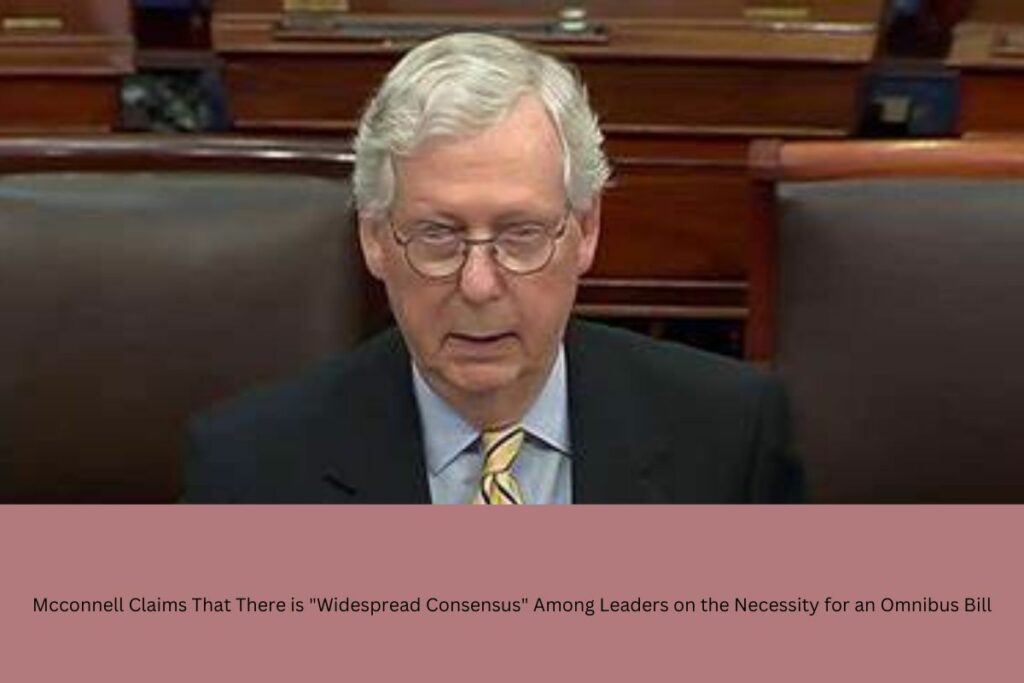Senate Minority Leader Mitch McConnell (R-Ky.) said Tuesday that there is “widespread consensus” among Washington leaders on the need to enact an omnibus budget bill next month, despite conservative requests to postpone such choices until next year.
However, the Republican leader warned that there are “major barriers” to reaching an agreement, which means negotiations might last until Christmas to avoid a government shutdown. “We had a fantastic meeting. Outline the issues that we are all facing as a group.
“I think there’s universal agreement that an omnibus would be preferable than a [continuing resolution], but there are some substantial challenges to overcome,” McConnell said after meeting with President Biden and congressional leaders at the White House.
Defense and Ukraine funding is “near the top of the agenda” for him and the majority of his colleagues, he said. He did, however, say that Democrats’ call for more nondefense discretionary spending is a “sticking point.”
You May Be Interested In:
- After Being Re-elected, What Will Newsom Do?
- Mastriano, a Trump Supporter, Has Conceded the Governorship of Pennsylvania
“We’ll keep talking to each other,” he continued. McConnell, Senate Majority Leader Charles Schumer (D-NY), Speaker Nancy Pelosi (D-CA), and House Minority Leader Kevin McCarthy (R-CA) will meet with the Democratic chairmen and Republican ranking members of the Senate and House Appropriations committees on Wednesday to discuss the spending package’s outlines.
On Tuesday, the four Senate and House party leaders met with Biden. “We had a wonderful conversation regarding government funding. “We all agreed that an omnibus would be preferable to a [continuing resolution],” Schumer said after the meeting.
“We each wrote out our omnibus criterion. They obviously differ, but the four appropriators and four leaders have agreed to meet as early as tomorrow to try to fix the matter and avert a government shutdown. So it was a positive and fruitful meeting,” he remarked.
The fact that McConnell and McCarthy have agreed on the importance of passing an omnibus spending plan rather than a stopgap spending bill or continuing resolution that would halt federal funding until next year is a significant move.
Conservatives backed by Sens. Rick Scott (R-Fla.), Ted Cruz (R-Texas), and Mike Lee (R-Utah) have advocated for a stopgap measure that would extend until 2023, giving Republicans more leverage in budget negotiations once they control the House.
McCarthy, who is vying for Speaker, appears to prefer starting the next Congress with a clean slate rather than negotiating a huge spending agreement with Democrats while commanding a narrow House GOP majority. After the same-sex marriage bill was signed, the White House was lit up in rainbow colors.
McDaniel is attempting to fend off an RNC leadership challenge. Scott criticized Republican leaders for “caving” to Democrats’ spending demands in an op-ed published in the Washington Examiner on Tuesday. “I ran for Senate leader because the current strategy of routinely caving in and allowing Schumer and Biden to win must end, and because we must become a party with a plan to rescue America,” Scott wrote, referring to his unsuccessful bid to challenge McConnell for the top Senate Republican leadership job earlier this month.

